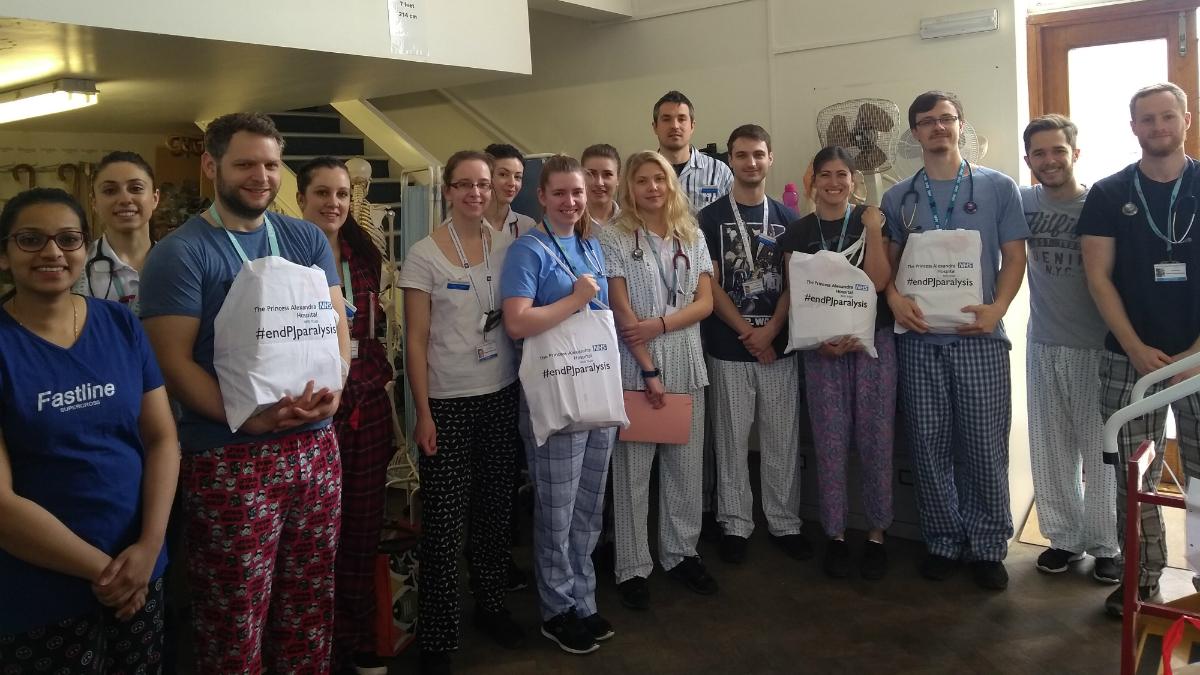Physiotherapy staff are pledging their support for this year’s #EndPJparalysis campaign, which runs from 17 April to 26 June.

The therapies team at Princess Alexandra Hospital NHS Trust in Harlow began their working day in their pyjamas. Pictured, below, is Damian Purcell, a physio on Saunders ward, the short stay assessment unit.
The campaign aims to encourage patients, wherever possible, to change out of their pyjamas, get up out of bed and moving.
The initiative began in New Zealand and was created by NHS-trained nurse Brian Dolan. It has gained support in the UK - with a successful campaign last year that saw many CSP members taking part.
This year, the campaign organisers are asking healthcare professionals across the UK to sign up to a ‘70-day challenge’ and get patients dressed and moving.
Falls prevention practitioner and physiotherapist Christopher Tuckett is among those supporting for the campaign, along with his colleagues at Princess Alexandra Hospital NHS Trust in Harlow, Essex.
He told Frontline: ‘I wore pyjamas to work recently to publicise the campaign, and we’ve recently set up associated information stands in public-facing areas around the trust - staffed by physios and our occupational therapy colleagues - to allow us to strike up conversations about deconditioning with both staff and visitors.’

Mr Tuckett, who is part of a core team of therapists responsible for planning the hospital’s challenge, said the entire therapies department is backing #EndPJparalysis.
‘We are all really keen to support the campaign, as the principles of empowering patients to remain mobile and independent go to the heart of what it means to be an allied health professional.
‘It helps us deliver key messages and start conversations about the importance of maintaining function and trying to prevent the deconditioning that can so quickly result from a prolonged hospital stay.’
He added that he had previously delivered a TedX talk that focused on related issues, entitled Hospitals: agents for care or harm?
Essential role of physiotherapy
Other CSP members planning to take part include the physiotherapy management team at Hywel Dda University Health Board.
Marilize du Preez, a physiotherapist and part of the health board’s transformation team, is responsible for implementing their involvement in the campaign.
She said: ‘Physiotherapy engagement is key in changing the culture and behaviour for both patients and healthcare professionals to prevent learnt helplessness and preventable deconditioning.
‘We are trying to create a culture in health where patients are empowered, promoting dignity and independency and reduce preventable deconditioning.’
The health board is ensuring all its signage and advertising is bilingual (available in both English and Welsh) and have added their own thoughts to the campaign’s central message, adjusting it to:
- Get up, get dressed, be active, so all patients can be engaged in activity however small, physically and psychologically

The physio management team at Hywel Dda University Health Board show their support for the 70-day challenge. (Left to right): Vicky Stevenson, senior physiotherapy manager, Helen Annandale, head of physiotherapy and senior physiotherapy manager Susan Griffith
Susan Griffith, a senior physiotherapy manager at the heath board, said: ‘We can all motivate and encourage safe meaningful activity. We must maximise patients’ assets and abilities, stop physical and psychological deconditioning and focus on helping them get fit for function.
‘The activity of getting dressed is a catalyst for function and positive psychology. It is a ritual prior to purposeful activity and we are tapping into that psychology to motivate people and maximise independence and abilities.
‘It provides an opportunity to assess a person's ability to move and function and generate plans to improve their independence and go home sooner.'
She added that the campaign encouraging staff to see each individual ‘as a person not a patient’, as this could help to prevent people taking on the ‘role’ of a sick person.
Promoting a culture of person centred care
Vicky Stevenson, also a senior physiotherapy manager at Hywel Dda, said: ‘EndPJParalysis endorses the concept of person centred care and the patient’s vision of "what matters to me and my personal goals". The aim is to maximise autonomy and independence, and physiotherapy is essential in driving this cultural change.
Helen Annandale, the board’s head of physiotherapy, added: ‘We all have a responsibility to ensure that we find out about a person and their abilities and then support them to get dressed and move.
‘Treat them as a person rather than a patient - we can change the culture.’
Physio staff can download an EndPJParalysis app via the Apple Store or Google Play.
Author: Robert Millett
Find Out More
Number of subscribers: 0